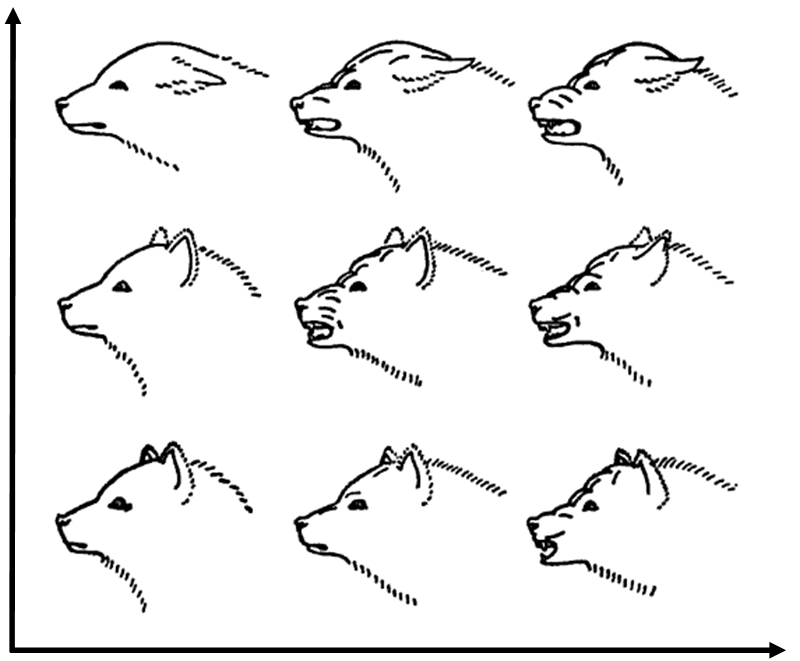“A Field Guide to Otherkin” is a book by Lupa, a
broadly Neo-Pagan author based in Seattle. Otherkin is the name of an American
subculture of mostly young people who identify as animals or other non-human
creatures. Lupa herself identifies as a wolf, or perhaps a werewolf (Lupa is
Latin for she-wolf). Her book was written before Otherkin became a well-known
pop culture phenomenon.
I admit that I find the “field guide” difficult to review. Often, Otherkin come across as attention-seeking special snowflakes or as escapees from the local laughing academy. At other times, they sound more Neo-Pagan or New Age-oriented, and hence more legitimate. Lupa's book left me somewhat bewildered! I also got the impression that Otherkin aren't really one homogenous subculture after all, but rather a spectrum of many different belief-systems, some of which co-exist under the same umbrella. Not all accept the Otherkin label. Today, many Otherkin seem to be teenagers experimenting with their identity, making comparisons to Queers or even Emos and Bronies more apt than the religious-spiritual orientation found in Lupa's book. However, it seems that Otherkin accusing each other of being fakes was a common occurrence already when “the field guide” was written. Perhaps Otherkin are best described as a phenomenon combining traits of Neo-Paganism, youth subculture, modern pop culture and (at least in some cases) sheer delusion. Lupa herself seems to be a relatively serious Neo-Pagan and practitioner of various forms of magic, while the mainstream media (perhaps inevitably) often interviews Otherkin who seem confused or frivolous.
The most common types of Otherkin are known as therians or therianthropes. They identify as (or with) earthly animals. Wolves and big cats are overrepresented. A related kind of Otherkin identify as animals known only from mythology, usually dragons. Another important part of the community consists of people who claim to be elves, fairies, angels or even demons. The elves often have elaborate mythologies about their origins in another dimension of reality. Further, there are vampires, both psychic and sanguinary. More controversial are Otakukin or Mediakin (today known as Fictionkin), who claim to be incarnated versions of popular characters from comic books or animated cartoons! Manga and anime characters are overrepresented here. There are also people who identify as Kitsune, Japanese fox spirits (Kitsune are apparently popular in modern Japanese pop culture, but the tradition is older and connected to Shinto). A phenomenon only mentioned in passing by Lupa is people who claim to be space aliens. Presumably, Starseed is a more New Age-related thing. Still, the parallels with Otherkin are obvious. (For the record, the present reviewer does *not* claim to be an alien. I'm 100% Homo sapiens sapiens, for good or for worse!)
Otherkin have very different ideas about how or why they feel and act non-human. The most common speculation is reincarnation. A wolf which reincarnates as a human can retain memories and behavioral traits of his earlier lupine existence. Of course, reincarnation doesn't explain Fictionkin, who must concoct a more exotic theory about parallel realities with different timelines. Presumably, Japanese manga and anime characters are real people in another dimension! More “old school” explanations (at least for therianthropy) include totemism and possession, shamanic abilities, special sensitivity to astral energies of an “animal” nature, or archetypes which for one reason or another affect some people more than others. Animalistic or mythological archetypes can be invoked during magical rituals, and so can totemistic spirits and occult energies.
However, most Otherkin don't claim to be humans somehow affected by animal spirits, but actual animal spirits trapped in a human body. This is what makes the reincarnation theory the most popular one. At least to the present reviewer, this is the least believable option. It evokes obvious skeptical counter-arguments: Why would wolves reincarnate as humans? Why are wolves and big cats overrepresented among Otherkin? Why don't rodents, beetles, worms and bacteria reincarnate as humans? Or apes, for that matter? (Strangely, no Otherkin surveyed by Lupa claimed to be a gorilla or chimpanzee! Maybe they lack the gorilla mindset.) Why don't wolves reincarnate as cats, making us observe house cats with lupine traits? Aren't *all* humans reincarnated animals, and if so, why don't the rest of us remember anything? Why do most Otherkin behave like humans, rather than as their chosen kintypes? And where the hell do vampires come from? Today, with the “Social Justice Warriors” taking over everything, even more questions come to mind. Thus, one Otherkin website I consulted claims that transracials can't be part of the Otherkin community. In other words, you can claim to be a reincarnated wolf, dragon or anime character as much as you like, but you can't claim to be a reincarnated person of color if you're White! Why would a cosmic thing like reincarnation follow early 21st century standards of political correctness in Portland, Oregon?
Finally, I have some more formal objections to the book. First, it's grossly overpriced. Second, the type is too small. The italicized sections in particular are difficult to read (at least to my human, all too human eyes). Third, the neutral pronouns “s/he” and “hir” are annoying. Fourth, I noticed that the word `kin is spelled with a beginning mark, while the term non'kin is spelled with an ending mark! Is there some kind of philosophical reason behind this, I wonder? OK, my main objection was the small type…
Since Lupa's “A Field Guide to Otherkin” seems to be the only good introduction to this subcultural cluster, I will give it four stars despite the above-mentioned problems. As for Otherkin themselves, my suspicion is that the pop cultural and teen angst aspects will eventually be weeded out, while the more “classical” elements will remain and eventually blend back into the pagan/neo-pagan and esoteric traditions they once emerged from.
As for the vampires, they will be hunted down by Buffy!

No comments:
Post a Comment